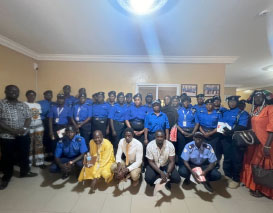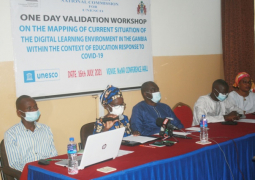
The training held at the Police Credit Union conference hall in Kanifing, basically, sought to provide an opportunity for the police to be more familiar with the mandate of the Commission, while at the same time arming them with the necessary knowledge and skills to accurately identify consumer cases, and the types of cases to refer to the Commission.
The commission believes the police have over the years been instrumental in referring consumer complaints to the Commission that have been reported to police stations. Thus, as a Commission, they recognize that training and continuous advocacy with all relevant actors play a significant role in the overall attainment of their objective of protecting the welfare of consumers.
In an interview with The Point, Muhammed Lamin Drammeh, Advocacy and Communication Officer at GCCPC, explained that the training forms part of their project for the last quarter, recalling that they earlier organised similar training for Police Officers in the West Coast Region.
The Commission, he added, is guided by three Acts namely The Gambia Competition Act 2007, The Gambia Consumer Protection Act 2014 and also the Essential Commodity Act 2015.
“Over the years, the Police have been very instrumental in referring consumer complaints to the Commission. So as part of our advocacy strategy, we believe equipping the police officers on the mandates of the Commission would definitely help them to understand what are consumer cases and non-consumer cases.”
Drammeh expressed optimism that the training would significantly help participants to be able to make informed-decision especially when they come across such complaints in their line of duty before filing complaints to the commission.
The capacity building, he added, would also help reduce non-consumer complaints to the Commission.
While underscoring the role of Police in society, Drammeh, however, noted that people sometimes referred complaints to the Police which in real sense should have been referred to the Commission.
“So that is why we are trying to equip the Police on our mandate, so that when they receive cases of such, they would direct the complainant to the commission, where we will do our best as per our mandates to ensure that consumer’s rights are protected. Because you know we have consumer’s rights and responsibility as the saying goes, right goes with responsibilities.”
Further on the variety of activities they conduct, which include market surveillance to study the prices of essential commodities in the market, Drammeh noted that part of their responsibilities as a commission is try as much as they can, to curb anti-competitive practices in the market.
Also speaking, Basirou Njie, principal economist at The Gambia Competition and Consumer Protection Commission (GCCPC), underscored the importance of the forum, saying 80 percent of the cases they received recently is referrals from The Gambia Police Force.
“So as a result, building their capacity to better understand the market and conducts that are anti-competitive is very important making sure that businesses are operating in a free and fair competitive landscape.”
Principal Economist Njie revealed that there are two types of consumers namely marginal and infra-marginal consumers, stating that the greater percentage of marginal consumers, the better as a country to make business operations in a fair manner.
In light of this fact, he acknowledged the importance of the training, as it would enable them better understand market dynamics and help to spot check some anti-market practices.
The event was characterised with presentation on the role and mandates of the commission and other anti-market practises affecting consumers in the country.





